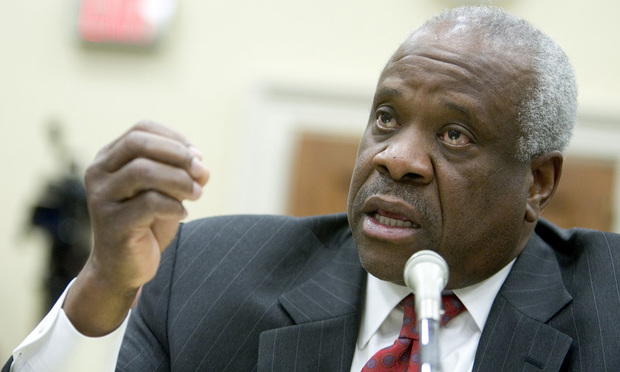How Justice Thomas Picked Atlanta Solo Amy Weil for Coveted Amicus Argument
“I have been pretty relentless at times. I give my card everywhere and he probably has a lot of them,” Amy Weil of Atlanta's The Weil Firm says.
January 09, 2019 at 12:23 PM
5 minute read
 Justice Clarence Thomas (2015). Photo: Diego M. Radzinschi/ ALM
Justice Clarence Thomas (2015). Photo: Diego M. Radzinschi/ ALM
Atlanta appellate attorney Amy Weil says she hands out her business cards whenever opportunities arise. A number of those cards and a professional connection to Justice Clarence Thomas earned her a U.S. Supreme Court argument that many lawyers would covet.
Weil of The Weil Firm was picked last year to argue as a friend of the court, supporting an appeals court decision that the U.S. Justice Department had chosen no longer to defend. It was a rare opportunity—the court picks amicus counsel only a handful of times every year, and those slots have often gone to former Supreme Court clerks.
“When the court asks for your help, the only real answer is yes. I took this as a public service,” former Thomas clerk and Gibson, Dunn & Crutcher partner Helgi Walker, who argued as an appointed amicus in 2016, once remarked in an interview.
Thomas broke with that tradition in appointing Weil.
Weil lost her first high court case Tuesday when the unanimous decision in Culbertson v. Berryhill was issued. Just hours after she heard the news, there was only gratitude for what she called the “awesome experience” of arguing before the justices and a “leap of faith” by Thomas.
Thomas had picked Weil as amicus counsel to defend a ruling by the U.S. Court of Appeals for the Eleventh Circuit after the U.S. Justice Department, in a change of position, agreed with the petitioner, Richard Culbertson, an Orlando, Florida, social security disability practitioner.
 Amy Weil
Amy WeilWeil said Thomas likely was aware of her long appellate experience in the Eleventh Circuit, for which Thomas serves as circuit justice. Weil was a former federal prosecutor who spent 25 years in the U.S. Attorney's Office for the Northern District of Georgia, 18 of which she served as chief of the appellate division. She has argued five en banc Eleventh Circuit arguments.
Thomas, Weil said, has spoken twice at the Eleventh Circuit Appellate Practice Institute, a seminar that she helped to establish. “I had the pleasure of meeting him on several occasions and always expressed an interest in arguing in the Supreme Court,” Weil said in an interview. “I have been pretty relentless at times. I give my card everywhere and he probably has a lot of them.”
Weill said Thomas was “very generous” to offer her the argument because he could have turned to a regular of the Supreme Court bar. “It's a lot of work and having experience is helpful,” she said. “But it is also good for them to hear from other people, not just the people they are used to hearing from. I think others might approach arguments in a different way if not part of the Supreme Court bar.”
Arguing at the high court can be “pretty much a nightmare,” Justice Elena Kagan said in remarks in 2017—but generally not for members of the Supreme Court bar.
Many arguments are made by what Kagan described as “repeat players”—lawyers who “know the court, who know the process of arguing before the court, who know what it we like, who know what they should be doing, what they shouldn't be doing.”
 Justice Elena Kagan (2015). Credit: Diego M. Radzinschi / ALM
Justice Elena Kagan (2015). Credit: Diego M. Radzinschi / ALMWeil said arguing the case was her “greatest professional experience,” while writing the brief was the hardest. “I did eight moot courts” she said. “I would have done more. You can never prepare enough. The bar, my colleagues, were so generous with their time in helping to moot me.”
Weil said she hopes her “outsider” appointment sets a precedent for more such appointments and more appointments of women. And, yes, she would do it again if asked. “Of course,” she said.
The Culbertson case may have flown low on the public's radar, but it was important to social security disability lawyers who handle some of the more than 12,000 social security disability appeals reviewed annually by federal courts.
In his opinion, Thomas agreed with Culbertson's counsel, Daniel Ortiz of the University of Virginia School of Law, that federal law did not cap attorney fees at 25 percent of a claimant's past-due benefits for an attorney's representation both before the agency and the court but had separate 25 percent fee caps for court and agency representations.
Although rejecting Weil's contrary arguments, Thomas said she “ably discharged” her assigned duties.
Read more:
Breaking Streak, SCOTUS Appoints Advocate Outside Ranks of Former Clerks
Deepak Gupta Gets Call to Argue Position Trump's DOJ Abandoned
Kagan Says Repeat Players at SCOTUS 'Know What It Is We Like'
SCOTUS Picks O'Melveny Partner to Argue in Case Challenging SEC Judges
Gibson Dunn Partner Reflects on Appointed 'Friend' Role in Supreme Court Case
This content has been archived. It is available through our partners, LexisNexis® and Bloomberg Law.
To view this content, please continue to their sites.
Not a Lexis Subscriber?
Subscribe Now
Not a Bloomberg Law Subscriber?
Subscribe Now
NOT FOR REPRINT
© 2025 ALM Global, LLC, All Rights Reserved. Request academic re-use from www.copyright.com. All other uses, submit a request to [email protected]. For more information visit Asset & Logo Licensing.
You Might Like
View All
Brownstein Adds Former Interior Secretary, Offering 'Strategic Counsel' During New Trump Term
2 minute read
Weil, Loading Up on More Regulatory Talent, Adds SEC Asset Management Co-Chief
3 minute read
FTC Sues PepsiCo for Alleged Price Break to Big-Box Retailer, Incurs Holyoak's Wrath
5 minute read
Supreme Court Will Hear Religious Parents' Bid to Opt Out of LGBTQ-Themed School Books
Trending Stories
Who Got The Work
J. Brugh Lower of Gibbons has entered an appearance for industrial equipment supplier Devco Corporation in a pending trademark infringement lawsuit. The suit, accusing the defendant of selling knock-off Graco products, was filed Dec. 18 in New Jersey District Court by Rivkin Radler on behalf of Graco Inc. and Graco Minnesota. The case, assigned to U.S. District Judge Zahid N. Quraishi, is 3:24-cv-11294, Graco Inc. et al v. Devco Corporation.
Who Got The Work
Rebecca Maller-Stein and Kent A. Yalowitz of Arnold & Porter Kaye Scholer have entered their appearances for Hanaco Venture Capital and its executives, Lior Prosor and David Frankel, in a pending securities lawsuit. The action, filed on Dec. 24 in New York Southern District Court by Zell, Aron & Co. on behalf of Goldeneye Advisors, accuses the defendants of negligently and fraudulently managing the plaintiff's $1 million investment. The case, assigned to U.S. District Judge Vernon S. Broderick, is 1:24-cv-09918, Goldeneye Advisors, LLC v. Hanaco Venture Capital, Ltd. et al.
Who Got The Work
Attorneys from A&O Shearman has stepped in as defense counsel for Toronto-Dominion Bank and other defendants in a pending securities class action. The suit, filed Dec. 11 in New York Southern District Court by Bleichmar Fonti & Auld, accuses the defendants of concealing the bank's 'pervasive' deficiencies in regards to its compliance with the Bank Secrecy Act and the quality of its anti-money laundering controls. The case, assigned to U.S. District Judge Arun Subramanian, is 1:24-cv-09445, Gonzalez v. The Toronto-Dominion Bank et al.
Who Got The Work
Crown Castle International, a Pennsylvania company providing shared communications infrastructure, has turned to Luke D. Wolf of Gordon Rees Scully Mansukhani to fend off a pending breach-of-contract lawsuit. The court action, filed Nov. 25 in Michigan Eastern District Court by Hooper Hathaway PC on behalf of The Town Residences LLC, accuses Crown Castle of failing to transfer approximately $30,000 in utility payments from T-Mobile in breach of a roof-top lease and assignment agreement. The case, assigned to U.S. District Judge Susan K. Declercq, is 2:24-cv-13131, The Town Residences LLC v. T-Mobile US, Inc. et al.
Who Got The Work
Wilfred P. Coronato and Daniel M. Schwartz of McCarter & English have stepped in as defense counsel to Electrolux Home Products Inc. in a pending product liability lawsuit. The court action, filed Nov. 26 in New York Eastern District Court by Poulos Lopiccolo PC and Nagel Rice LLP on behalf of David Stern, alleges that the defendant's refrigerators’ drawers and shelving repeatedly break and fall apart within months after purchase. The case, assigned to U.S. District Judge Joan M. Azrack, is 2:24-cv-08204, Stern v. Electrolux Home Products, Inc.
Featured Firms
Law Offices of Gary Martin Hays & Associates, P.C.
(470) 294-1674
Law Offices of Mark E. Salomone
(857) 444-6468
Smith & Hassler
(713) 739-1250










